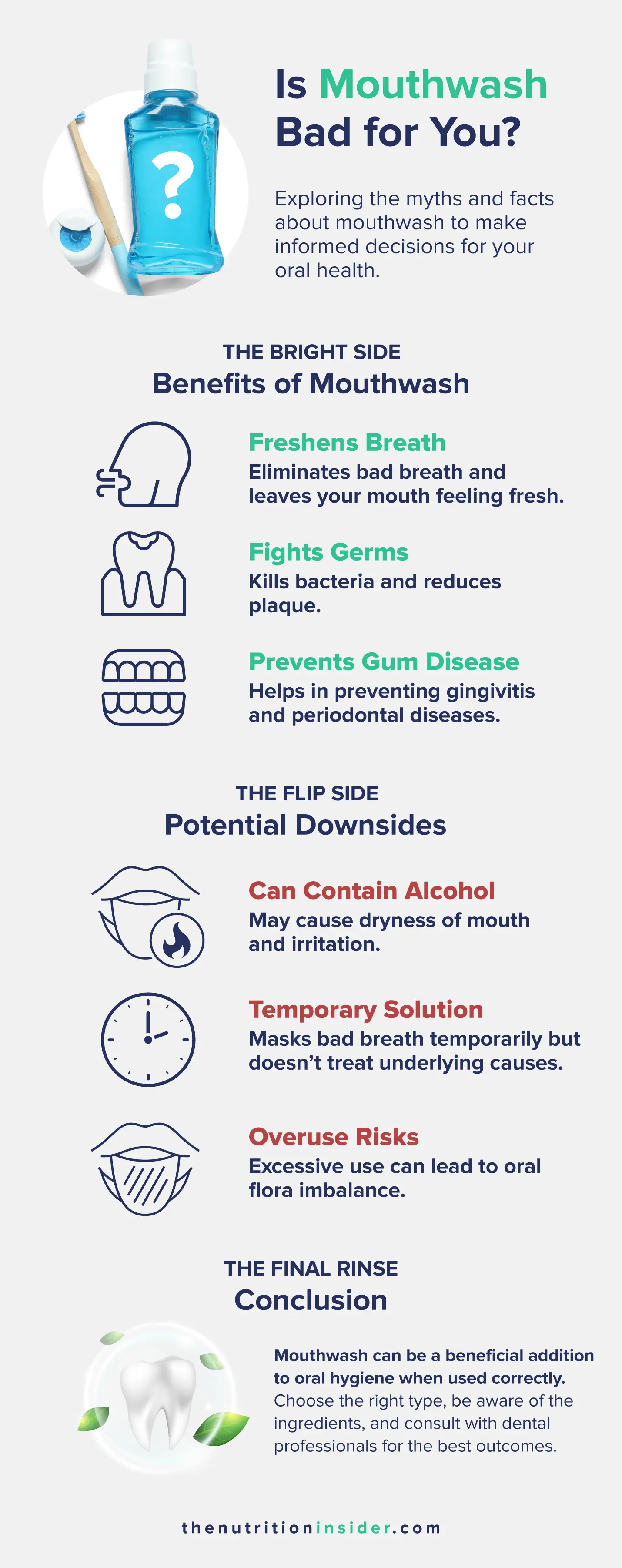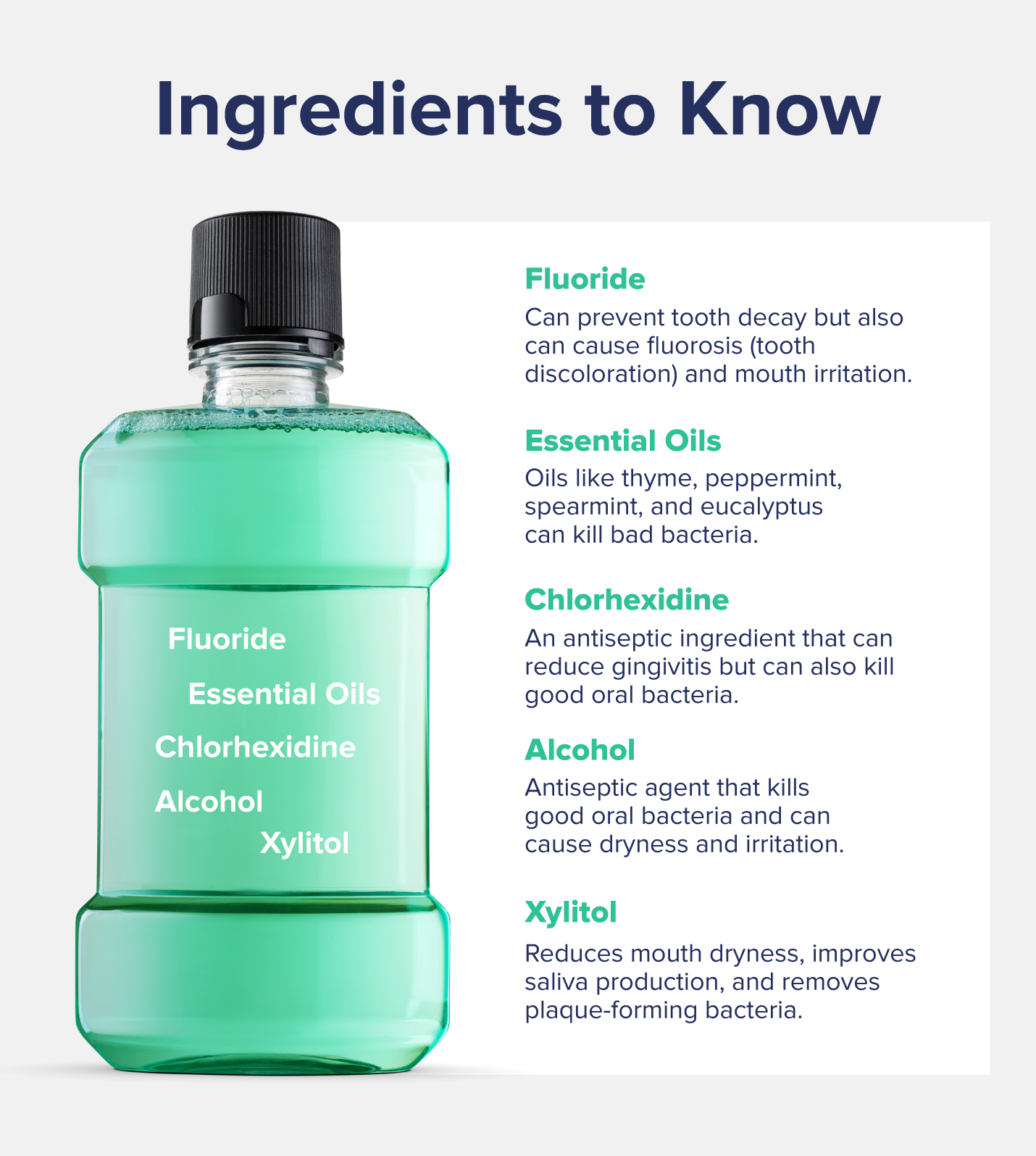Talk to a Registered Dietitian and use INSIDER20 for 20% off!
Talk to a real Dietitian for only $99: Schedule Now
This post contains links through which we may earn a small commission should you make a purchase from a brand. This in no way affects our ability to objectively critique the products and brands we review.
Evidence Based Research To fulfill our commitment to bringing our audience accurate and insightful content, our expert writers and medical reviewers rely on carefully curated research.
Read Our Editorial Policy
Although using mouthwash seems like a simple step in your oral health routine, it turns out that it’s not so straightforward.
Considering factors like alcohol and antiseptic ingredients, oral microbiome disruption, burning or pain from use, and mouth dryness, many people are now uncovering the potential downsides of using mouthwash.
That’s not to say there are no benefits to mouthwash—there are many—but there are also healthier alternatives to conventional mouthwash that use more natural ingredients and avoid these issues.
If you’ve been curious whether mouthwash is bad to use daily, this article is for you.

It’s not a cut-and-dry answer to whether mouthwash is good or bad for you, as there are many different types of mouthwash with highly variable ingredients.
In general, alcohol-based, conventional mouthwashes are not great for you, but more natural, alcohol-free mouthwashes that utilize plant or herb oils can be beneficial for your daily oral hygiene routine.
Before we dive into the negatives, let’s look at the potential benefits of using mouthwash.
Depending on the type of mouthwash used, using mouthwash regularly has many potential oral health-related benefits, including:
According to the American Dental Association, mouthwashes can reach areas of your mouth that your toothbrush can’t, which can help to provide an extra layer of protection against tooth decay and gum disease and reduce plaque buildup.
As untreated gum disease can lead to gum recession and eventual tooth loss, therapeutic mouthwashes can be beneficial to prevent these issues.
While there are plenty of benefits to using mouthwash, there are also some drawbacks to consider—especially when it comes to antibacterial, alcohol-based mouthwashes.
Although they do their job of killing bad bacteria and fighting tooth decay, they also kill good bacteria, which are necessary for our oral microbiome to thrive.
You may think that the oral microbiome solely impacts your mouth, but it actually affects areas all over your body, including cardiovascular and metabolic health.
Killing off all the bacteria in your mouth can deplete oral nitrate-reducing bacteria. This leads to reduced nitric oxide availability—a vasodilating compound linked to better heart, vascular, respiratory, and immune health.
In a 2020 study, researchers found that people who used antimicrobial mouthwashes twice daily or more had 85% greater rates of hypertension than less frequent mouthwash users.
Although this was a smaller study, ongoing research is actively looking at the correlation between the oral microbiome and its effects on cardiovascular health to verify these results.
Alcohol is highly drying, so the use of alcoholic mouthwashes can cause chronic mouth dryness known as xerostomia.
Xerostomia occurs when your salivary glands don’t produce enough saliva to lubricate your tongue. Saliva also helps to prevent cavities, as it supports the process of remineralization in your teeth.
Therefore, even though many mouthwashes claim to prevent cavities, they can actually make cavities worse by drying out the mouth and reducing natural saliva production.
Some mouthwashes have high concentrations of alcohol, menthol, or oils from cinnamon, eucalyptus, or cloves. This can cause burning or pain after use—especially in people with sensitive mouths, canker sores, or any oral injury.
A mouthwash that causes a burning sensation does not necessarily mean it’s working—but it does mean it has an ingredient that could be irritating you (typically alcohol, but it could also be menthol, natural oils, or chlorhexidine).
Some studies have also suggested that alcohol-based mouthwashes can negatively affect soft tissue in the mouth, which may increase the risk of oral cancer or head and neck cancers.
Another potential downside of mouthwash is that it can temporarily mask bad breath, which has a root cause that should be addressed.
Consistently using mouthwash to cover up chronic bad breath may prevent you from finding a permanent solution.
Not only that, but alcohol-based mouthwashes can make your breath worse.
The minty tingling sensation can cover up bad breath in the short term. However, alcohol in mouthwash dries out the mouth too much, reducing healthy saliva levels needed to manage oral bacteria that lead to fresh breath.
Many mouthwashes can irritate the soft tissues of the mouth, especially in people with open sores, canker sores, oral lesions, or ulcers.
In fact, some mouthwashes can even cause canker sores or mouth ulcers.
This is because alcohol and other active ingredients like sodium lauryl sulfate (a foaming agent found in many mouthwashes and toothpastes) can impact your cheeks’ protective layers by sloughing off the skin on the inside of your cheeks, potentially causing sores or ulcerations.
Mouthwash is not always bad for you, but many common ingredients in conventional mouthwashes can cause adverse side effects.
The biggest culprit is alcohol, which leads to mouth dryness, increased risk of cavities, reduced saliva output, mouth irritation, burning, bad breath, microbiome disruption, reduced production of nitric oxide, and potentially even increased oral cancer risk.
Other mouthwashes that contain antiseptic or antibacterial ingredients that wipe out the mouth’s microbiome can have similar adverse effects, while herbal or essential oil-based mouthwashes are much less likely to cause this harm.

Using an alcoholic mouthwash daily could be considered bad for your health.
While it does kill off harmful bacteria, it can also kill good bacteria—including a subset called nitrate-reducing bacteria. Lower levels of nitrate-reducing bacteria lead to reduced nitric oxide availability—a compound linked to heart, vascular, respiratory, and immune health.
For this reason, antibacterial mouthwash is linked to worse cardiovascular outcomes.
However, using an alcohol-free mouthwash that is not antiseptic is fine to use every day.
All dentists agree that any child under the age of six should never use mouthwash—even if it says it’s “kid-safe.” This is because of the high risk involved with accidentally swallowing mouthwash—check out this article for more information.
Many holistic dentists, like Dr. Mark Burhenne, do not recommend conventional mouthwash because it can:
• Cause dry mouth and reduce saliva output
• Cause cavities because saliva is needed for remineralization
• Disrupt the mouth’s microbiome by killing bacteria
• Deplete nitric oxide and impact cardiovascular health
There are many alternatives to conventional mouthwash that do not use alcohol or other potentially harmful ingredients. Some safe mouthwash options include:
There are many alternatives to conventional mouthwash that do not use alcohol or other potentially harmful ingredients. Some safe mouthwash options include:
There are many alternatives to conventional mouthwash that do not use alcohol or other potentially harmful ingredients. Some safe mouthwash options include:
• Twice Oral Wellness Immunity Rinse
• Hello Naturally Healthy Anti-Gingivitis Mouthwash
• Dr. Brite Natural Whitening Vitamin C Mouthwash with Mint and Activated Coconut Charcoal
• The Natural Dentist Healthy Gums Mouth Rinse
• CloSYS Sensitive Mouthwash
• Boka Restore Mouthwash Tablets
Mouthwash with alcohol can be harmful to several aspects of health.
Alcohol can cause mouth dryness, which may increase the risk of cavities by reducing the remineralization process that comes from healthy saliva production. It can also cause or worsen canker sores and mouth ulcers.
Mouthwash with alcohol also depletes healthy bacteria in the mouth, potentially leading to cardiovascular concerns like high blood pressure because of disrupted nitric oxide availability.
But you don’t need alcohol in your mouthwash—while alcohol can kill bacteria, so do many other natural compounds, including menthol (spearmint and peppermint), thymol, eucalyptus oil, and other oils.